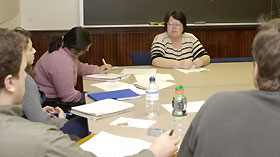|
This is an archived article.
For the latest news, go to the Advance Homepage
For more archives, go to the Advance Archive/Search Page. |
||
|
Distinguished Professor Deborah Fein
When Deborah Fein was a graduate student in clinical psychology three decades ago, she didn't know much about autism. Today, the professor of psychology is one of the leading researchers in the field.
"I wasn't planning on doing an internship that year," says Fein, recalling her days at Rutgers. "I had planned to write my dissertation. " But when her advisor told her about an unexpected opening for an intern at a child guidance clinic with a special school, she took it. "It was one of those serendipitous things that shapes your career," says Fein. The position involved working at a school for 'psychotic' children, as they were called at the time. Most of them were actually autistic, she says. "They were fascinating," Fein says. "These kids were so mysterious to me, their behaviors so amazing. I wanted to figure out why they did the things they did and what interested them in certain things." After working with the children for a while, she says, "It clicked. I knew I wanted to do research on autism." At the time, Fein says, autism was thought of as a psychodynamic condition - "they had parents who didn't love them, or they were somehow reacting to a bad environment. But after working with the children for six months, it was clear to me that was not the case. I believed that they a neurological disorder."
A Developing Field
But neuropsychology was in its infancy, and she had no idea where she might go to study. "Someone told me to do a post-doc at a place where I might want to live, because chances are that's where I'd wind up living," Fein says. With that advice, she embarked on a search, her own way: "I made a list of every article on autism that I thought was good, and noted where the authors were located." She ended up at the Boston University School of Medicine. There, she met Edith Kaplan, whom Fein describes as one of the nation's leading clinical neuropsychologists. She spent the next two years in Boston half time with Kaplan at the Boston VA Hospital and half time with Al Mersky, chief of the Laboratory of Neuropsychology at the medical school. Both became mentors and friends. Fein has been at UConn since 1984, when she was hired as an adjunct professor to teach a course in neuropsychology, and was appointed to a tenure-track position in 1988. "I leaped at the job when it was offered, and it's been wonderful," she says. "It's a fabulous place to work. As a Ph.D. and a woman, you're a first-class citizen here. And the department is a fabulous place to work: very collegial and supportive."
Role Model
Fein's research has spanned many areas of autism over the last 30 years: she has worked on language, brainstem functioning, cognitive profiles, different aspect of memory, and social functioning. She is presently working on several projects with colleagues in the psychology department. The largest deals with early detection of autism. They are also working on projects that involve early language development in children who were just diagnosed with autism and who have started treatment. At the other end of the spectrum, is a study involving children who, Fein says, are essentially recovered from their autism, to see if there are residual language deficits. She is working on a book on autism geared for elementary school teachers and also has a private practice doing neuropsychological evaluations of autistic children. Fein, who in 1999 was awarded a Faculty Excellence Award in Graduate Teaching from the Alumni Association, says she enjoys teaching at both the undergraduate and graduate levels. She likens teaching graduate students to raising children. "They come in and stay about five years," she says. "Then they move on, and it's sad to see them go. You oversee at least a good part of their educations and watch them develop into professionals." Miriam Liss, a former graduate student, says Fein "was an incredibly kind, caring advisor who always had time for her students. She was also a brilliant researcher who always had excellent ideas for new areas of research or better ways to design your project." Liss, an assistant professor of psychology at Mary Washington College in Fredericksburg, Virginia, added that Fein "was like a surrogate mother for all of us, and I'm happy to still be in touch with her regularly." Celine Saulnier, also a former graduate student, says Fein "is the reason I went to UConn for graduate school. "I sought out the program after learning about her research and work in the field of autism," Saulnier says. "I will forever be indebted to her for the extraordinary amount that I have learned - and am still learning - from her expertise. She is a true role model in every sense of the word, an exceptional teacher, distinguished researcher and clinician, and mentor." Charles Lowe, professor and head of the psychology department, says Fein is a "truly outstanding member of our faculty. Her research on the early detection of autism is outstanding, not only heavily funded by external grants, but also inclusive, involving both her faculty colleagues and graduate students in these important research endeavors, and also 'practically' important, providing a real service to the Connecticut community." |

